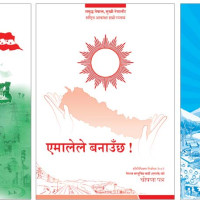- Friday, 20 February 2026
Health Literacy Helps Fight Diseases
Nepal has been consistently suffering from high maternal mortality and infant mortality rates compared to the global averages. Likewise, malnutrition, communicable and non-communicable diseases are also creating a severe health care havoc. Over that, Nepal has yet to effectively implement diagnostic and treatment interventions for commonly observed diseases at the community level. Consequently, the country’s health care system continues to lag significantly behind that of its South Asian neighbors.
Global experiences have shown that community awareness plays a crucial role in minimising the burdens of hazardous diseases. In fact, community awareness is a key factor in promoting a thorough understanding of health risks, health challenges, and subsequent remedies. This can be correlated with the recent experience during the COVID-19 pandemic in Nepal, which has emphasised the need for an informed community that understands health risks, potential prevention strategies, and efficient ways to navigate the healthcare system.
Community awareness
In addition to community awareness initiatives, an informed and conscious community can be developed by promoting health literacy early through school and university curricula. Such an initiative can significantly contribute to mitigating healthcare challenges, thereby developing a healthier society. Health literacy is the concept that was first introduced in the 1970s and is broadly concerned with the capacities of people to meet the complex demands of healthy living in a modern society. Over the years, the concept of health literacy has evolved immensely and by now it encompasses the ability to access a vast spectrum of public and community health issues. It also encompasses applying a contemporary health information practice to make informed and précised decisions about personal health and overall well-being.
Health literacy is most effective when knowledge of health awareness is integrated into the education system. This is more important as the young boys and girls are more vulnerable to diverse health risks. On the other hand, the knowledge disseminated to school and college students is more impactful as they can efficiently propagate the awareness within the family and subsequently to society. Integration of health literacy and value-based education (VBE) across primary, secondary and tertiary educational levels has been known to raise holistic wellbeing as well as ethical conscience in the students.
VBE emphasises ethical reasoning, empathy, civic duty, and moral character. It typically manifests in curricular activities that nurture respect, responsibility, and social engagement. VBE is based on philosophical and ethical foundations that include humanism, constructivism, a participative approach, and transformative learning theory. The young and vulnerable children can be molded according to the teaching content - the knowledge of basic health concepts, such as hygiene and nutrition, can be efficiently embedded. Over that, knowledge dissemination through play-based learning, especially in early childhood settings, enhances the effectiveness of the understanding and positively shapes the behavior of the children.
Simultaneously, values like empathy, respect, and cooperation can be developed through classroom routines and teacher modeling. Teaching of participatory health education with reflective value discussions from the primary level to the early adolescent students of the lower secondary levels has been shown to improve adolescents’ self-efficacy and social awareness. However, the capacity and value-based teaching modality of the teachers also play an important role in this perspective. Hence, professional development of the teacher that emphasises facilitation skills and reflective practice is essential to achieve the expected outcome.
Our school curriculum already encompasses health education but the content of the subject is based mostly on conventional classroom teaching modality. With the increasing concept of introducing VBE in the school curriculum, our policy makers and curriculum developers need to redesign the curriculum in accordance with the VBE concept. Consequently, integration of health literacy into VBE will aptly provide a holistic understanding of the interplay between core personal values, societal responsibility, and relevant health behaviour to the students from early on. In addition, this objective could be achieved by engraining relevant and contemporary health care topics within ethics and civics curricula.
In real-life settings, the immature and vulnerable students frequently face various dilemmas, such as jab decisions, organ donation, and mental health stigmas. The health literacy curriculum should appropriately incorporate and address such predicaments in a way that the relevant information is readily accessible and comprehensible to the students. In addition, the students need to be encouraged to make informed decisions that reflect both personal and societal well-being. For that, the curriculum should also include core individual values such as responsibility, honesty, and respect.
To conclude, the concept of health literacy has been gaining traction due to its ability to access, understand, evaluate and apply health-related information at the individual and community level. Hence, the incorporation of health literacy into our school and university curricula will facilitate the youngsters to understand the importance of health care, thereby improving public health outcomes and building a healthier society. Moreover, global practices have shown that integration of health education with VBE is an important tool in empowering people in making informed decisions about their health.
This, subsequently, reduces the burden of disease and improves the overall quality of life at the community level. Hence, it is imperative for our policymakers and curriculum developers to take a leaf out of the global practices and include health literacy and VBE in primary, secondary, and tertiary education levels. It is obvious that, provided the right support, resources, and community involvement, Nepal can create a sustainable culture of health literacy that will benefit the future generations in the long run.
(The author is a senior scientist and independent opinion maker based in Germany. pushpa.joshi@gmail.com)














